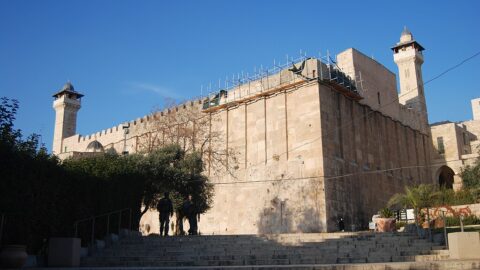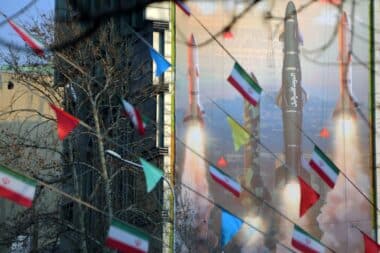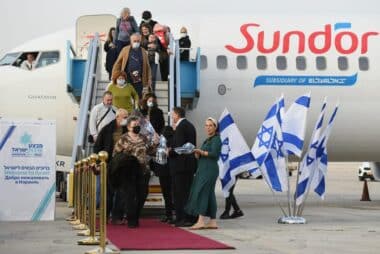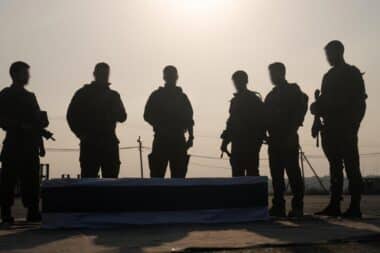If you missed last week’s episode, go check it out, because today is Part Two of our deep dive into Palestinian statehood. In Part One, we traced how Israel built the infrastructure of statehood between WWI and 1948, while Palestinians remained fragmented. Then we looked at the decades after 1948, when Jordan and Egypt controlled the West Bank and Gaza, and still, no Palestinian state emerged. And we did all this with the help of four experts – Samer Sinijlawi, Michael Koplow, Einat Wilf, and Ahmed Fouad Alkhatib.
Today, we’re picking up the story in 1967. We’ll talk about the Six Day War, the rise of Islamism, the Oslo peace process, and the Second Intifada — all the way up to the October 7th attacks and Emmanuel Macron’s dramatic announcement. Let’s jump back in.
Chapter 3: Upheaval.
We already did a three-part series on the Six Day War, so I’m not gonna rehash it here. For the purposes of this conversation, the war did three things.
- Brought the West Bank, East Jerusalem, and the Gaza Strip under Israeli control.
- Proved to the Palestinians that they really couldn’t rely on the rest of the Arab world, which had failed time and again to liberate Palestine.
- Left a vacuum for a new ideology to creep in. Pan-Arabism had failed. But maybe Islamism was the answer. (What’s Islamism, you ask? Good question:
Ahmed Fouad Alkhatib
It’s a political philosophy that combines Islam into political life with the goal of establishing hegemony of a religious rule over the population. Iran is a good example.
Noam
Got that? Cool.
So one million Palestinians now lived under Israeli control. And if the celebrations of this miraculous victory were raging, so were the debates in the halls of the Knesset. Because what on earth were the Israelis going to do with all this land, and with the one million people in it?
At the end of the day, Israel had three options.
- Keep the land. The West Bank, at least, was necessary for defense. If before the country had had “Auschwitz borders,” as Abba Eban once put it, it now had defensible borders. Strategically, the West Bank provided depth Israel had never had.
There was a second argument for keeping the land, of course, and that was the spiritual one. Well before the name Islam had even been uttered, this region was called Judea and Samaria, the cradle of Jewish civilization. According to some Israelis, the miraculous victory of the war was divine proof that the Jews were meant to rule it again. Those were the arguments for “keep it.”
- Option 2: “give it away.” Strategic depth and religious sentiment were all very nice. But, argued some in the Knesset, what if the Israelis just exchanged the land for peace? Auschwitz borders are dangerous when you’re surrounded by enemies. But when you’re surrounded by friends, who cares how narrow your land is? That just means you’re closer to your new BFFs.
- Argument 3 was the most cautious of them all. Just wait and see. We’ll keep the area under military rule until the situation is clarified.
Well, here’s what happened.
In September of 67, as Israel was having these internal discussions, the Arab League got together in the party capital of the world: Khartoum, Sudan, and issued a series of resolutions that would become known as the “Three No”s. No peace with Israel, no recognition of Israel, no negotiations with Israel.
Which rendered Argument 2 – let’s give it away! – more or less moot.
And so the Israelis chose a strange combination of Option 1 and Option 3: settling Jews in the territories while keeping Palestinians under military control.
But we have to remember something. The West Bank and Gaza of 1967 were not the West Bank and Gaza of today.
At first, daily life was surprisingly open. No checkpoints, no borders. Palestinians worked inside Israel, earned better wages, visited relatives they hadn’t seen in 19 years, even went to the beach in Tel Aviv. Israelis shopped in West Bank markets and learned to drive in Gaza.
I’m not saying it was sunshine and roses. Not at all.
Understandably, Palestinians resentment festered. They called it a “golden occupation,” jobs and money, but not the rights and protections Israeli citizens received. Some even helped to build the beautiful gated Jewish communities of the West Bank and Gaza, which many refer to as settlements, only to go home at the end of the day to a refugee camp whose tents had been replaced with ugly concrete buildings designed to shove in as many people as possible.
Of course resentment festered.
And the PLO was not helping matters. Because their preferred method of “liberating Palestine” mostly involved killing Israeli civilians.But for every schoolchild they massacred, for every bus or plane they hijacked, for every kidnapping or atrocity, the Israelis cracked down. And eventually, those tensions led to the First Intifada of 1987.
Even though he was only 15, Samer remembers that time well. That’s when he was arrested and spent years in an Israeli prison.
When he got out, he was a different person. And Israel was different too.
Samer Sinijlawi
The first Intifada, the Intifada that I was part of, where we were demonstrating and maximum throwing stones, it created the peace camp in Israel.
Noam
Sounds wild, right? Almost as wild as “prison made Samer into a peace activist.” But it’s true. After nearly six grinding, crushing, hellish years of violence and misery, the Israelis were exhausted. The Palestinians were exhausted.
And maybe it was time for the PLO to gain some international legitimacy. To stop hijacking planes and start going to meetings instead. The time had come to start making nice with their old enemy, Israel.
As for the Israelis, they were so tired of sending their children to the West Bank in tanks. So tired of pondering the horrible moral question: what’s worse? Having someone kill your child? Or knowing that your child might kill someone else’s?
So maybe it was time for Israel to recognize that the PLO could be a partner for peace. And maybe it was time to think seriously about a Palestinian state. Or at least to envision the possibilities.
Everyone talks about Oslo as the Israeli-Palestinian peace process, the OG, the one that started it all. In one sense, it’s true, because that’s the one that actually happened. That’s the one with the iconic handshake on the White House lawn and Bill Clinton beaming on TV. But Oslo wasn’t the first plan for Palestinian autonomy or Israeli-Palestinian peace.
Michael Koplow
The 80s and 90s when you have various plans that are floated. Most of these plans aren’t exactly statehood. They’re confederation plans, some sort of confederation between Jordan and the West Bank that would not be the sort of Palestinian state that we’ve come to think of since the 1990s. But these discussions about what you do with the Palestinians living in these areas and under whose sovereignty they should be and what that entity should look like really does start up again in earnest in the 80s and 90s. And there’s an episode in the 1980s where Shimon Peres as foreign minister actually successfully negotiates a deal with the Kingdom of Jordan, to have Jordan take the West Bank and have there be this Jordanian Palestinian confederation. And he brings it to Yitzhak Shamir, who is serving as the prime minister because there’s this unity government at the time and Shamir says no. when we think about when we think about kind of missed opportunities that that many people don’t know about that, I think in many ways is the biggest one.
Noam
That was Michael Koplow, Chief Policy Officer of the Israel Policy Forum, reminding us that Oslo wasn’t the only idea on the table. It was just the one that stuck.
Which brings us to…
Chapter 4: Oslo and Its Consequences
Michael Koplow
You often hear people pointing to Oslo as some sort of Palestinian statehood process. It actually was not. The Oslo Accords don’t say anything about a Palestinian state. They were supposed to be a temporary five-year accord. And at the end of that five-year period, Israel and the PLO as the legitimate representative of the Palestinian people were supposed to negotiate over some sort of permanent status. What that permanent status was going to be is not set. Now, it’s again, I think it’s assumed today that it would have been a Palestinian state. I think that’s a reasonable assumption in an alternate version of history, but Oslo did not explicitly call for Palestinian statehood.
Noam
It started with letters. Yes, letters. As in, those old-fashioned things you write on actual paper and send in the mail with honest-to-God stamps.
But these weren’t ordinary letters to be dropped into any old mailbox. These were letters of recognition. Israelis, finally recognizing their old arch-enemy, the PLO. The PLO, saying we’re ready to talk.
It was more than just talk. But it was less than a state.
Oslo established the following.
One: A democratic Palestinian government in the West Bank and Gaza, aka the Palestinian National Authority. If the PA could keep it together for five years, it would be replaced by a more permanent government structure.
Two: The Palestinians would manage their own infrastructure in the West Bank and Gaza for the first time. Seaports. Sewage treatment plants. Electricity. Remember, they had never had to do that. Not in the Mandate period. And not under Jordanian, Egyptian, and Israeli occupation. Here was the PA’s chance to take on the really unglamorous, unsexy parts of running a state. It’s not all national anthems and Miss Universe competitions, you know?
Three: Israel would withdraw from the Gaza Strip and parts of the West Bank, starting with the ancient city of Jericho.
Sounds a lot like laying the groundwork for a state.
You remember the four conditions for a state, right?
- Defined territory. Check, ish. The PA would rule exclusively and autonomously over 18% of the West Bank, known as Area A, which was home to most of the Palestinian population. In Area B, they’d maintain civil authority but would have to cooperate with the Israelis on security stuff. And in Area C, which was 60% of the West Bank, Israel would be in control. It wasn’t a ton of territory for the PA to rule autonomously. But it was defined.
- A regular population – Check.
- A government – Check.
- Capacity to enter relations with other states – Eh. I’m gonna say no to this one.
Two and a half out of four – well, it’s not a state, but it’s a start.
Unfortunately, that’s all it was. Because both Israeli and Palestinian society harbored extremists. And extremists, as we know, RUIN EVERYTHING.
Samer Sinijlawi
It started by Hamas in 95, where Rabin was proceeding with the Oslo Accord. He was evacuating Palestinian cities, delivering cities to the PA, entering Palestinian forces to the … middle of the Palestinian cities and Hamas was bombing the bus in the morning in Tel Aviv and in the evening in Jerusalem for God’s sake to the interest of whom they were working at that moment. I mean the guy was moving on, evacuating Palestinian cities, implementing the Oslo Accords. We were going in the past to a two-step solution and they bombed it. They destroyed it.
Noam
But it wasn’t only Hamas that was to blame.
I remember November 4, 1995 like it was 30 years ago, because it was. I was 10. A fifth-grader. Old enough to understand that something really, really bad had happened. Not quite understanding the ramifications.
Someone had killed the Israeli Prime Minister as he left a peace rally in Tel Aviv.
That “someone” was not an Arab.
Not a Hamas fanatic in a suicide vest.
Not an angry kid throwing stones.
It was a Jew. A religious one. Someone who had come from a similar community to mine. Who wore a kippah and prayed three times a day.
Who left the country in crisis.
To this day, I can’t help but wonder what if. What if Rabin hadn’t been murdered? Would the promise of Oslo have materialized? Would there be a Palestinian state?
Einat Wilf remembers those heady days well.
Einat Wilf
So I grew up in Jerusalem in the 80s and 90s into kind of socially and politically into the Israeli Labor Party. This is the moment when the Labor Party transitions from kind of more the socialism to the idea of land for peace that Israel has a path to peace.
The 90s are a decade of euphoria for me. As soon as I can vote, I vote for every Israeli prime minister that promises to bring peace. I am absolutely convinced that the only thing standing between us and peace is a state of Palestine, is getting out of the West Bank and Gaza. I’m against the settlements, believe that only the settlements and Israel’s presence in the West Bank and Gaza stand between us and peace. Huge proponent of dividing Jerusalem. I grew up in Jerusalem, always physically observed the lie of united Jerusalem, all these Arab villages. mean, Jerusalem was never united. So that’s why I’m concerned like divide the thing, just end this, give them a state and let’s be done with it. And again, I’m euphoric.
Noam
All that euphoria, gone, converted to horror. To shock. To shame. But the peace process didn’t die with Rabin. It didn’t die with the string of suicide bombs and stabbings sent by Hamas.
Somehow, it limped on, wounded and bleeding. Until in the year 2000, Prime Minister Ehud Barak made Arafat the proverbial offer you couldn’t refuse.
Israel would withdraw from 85–92% of the West Bank, plus all of Gaza. To compensate, Israel would annex settlement blocs close to the Green Line and give Palestinians land from Israel proper—“land swaps” totaling about 1–3%, and resulting in a contiguous Palestinian state.
Barak had an answer for even the thorniest issues.
Israeli security? Well, the Palestinian state would be demilitarized, and Israel would maintain “early warning stations” in the West Bank.
Jerusalem? He was open to compromise. He envisioned the Arab neighborhoods of East Jerusalem under Palestinian sovereignty, while the Jewish neighborhoods, including those built after 1967, would remain under Israel’s control.
Right of return for descendants of Palestinian refugees? That was a big fat no – but Israel would officially recognize the suffering and dispossession of Palestinian refugees.
Barak’s proposal went way beyond Oslo.
Because Barak was proposing a state.
Sure, it would be demilitarized.
Sure, it would have some wildly funky borders.
And sure, its capital, which is sacred to three faiths, would be awkwardly split between two populations who had spent the past 5 decades trying to kill each other.
But it would be a state, at last.
And the conflict would finally, finally end.
But Arafat walked away.
Arafat walked away.
And the question that keeps me up at night is why.
WHY?
Ahmed Fouad Alkhatib
Some will say, Well, he just wanted to bring it back to the Arabs because it was a radical idea and he wanted to get their thoughts. Some will say he wanted better terms. Some would say he wanted more time. Some would say he didn’t say yes, but he didn’t say no either But and I’ve read the Bill Clinton books. I’ve read different opinions I’ve talked to people who were present in the negotiations And they said, like, Arafat made a big fat mistake.
Noam
It’s a theme among Palestinian leadership. Bad choices. Terrible, critical mistakes that have kept the Palestinian people immiserated. That have forced ordinary people to pay the price of their leaders’ hubris and incompetence and extremism.
Ahmed Fouad Alkhatib
they have been a nation in waiting and a people in waiting. And yes, they’ve had corrupt leadership…. And we should not be collectively punished by the actions of our leaders. We should be given a chance at nation building. We should be given a chance at having hope and optimism so that the rest of my people are not subjugated to brainwashing, to violence, to this sense of hopelessness that then fuels further cycles of hate and violence.
Noam
But the cycle of hate and violence was just getting started. Because shortly after Ehud Barak made his historic offer, in the tail end of the year 2000, the Second Intifada erupted. And this one was far, far worse than the last.
Chapter 5: Consequences
I remember the Second Intifada very, very well. I lived in Israel for part of it. And I remember how scary it was. The feeling that at any moment, your entire world would collapse around you.
The entire world did collapse. More than 1,000 Israelis and 4,000 Palestinians: killed, often in the most horrific ways you can imagine. And with them, any semblance of trust.
Samer Sinijlawi
The second Intifada, when we started using arms… shooting, it killed the Israeli peace camp until now, of course.
Noam
It’s hard to exaggerate the trauma of the Second Intifada for Israelis. The string of suicide bombs, sometimes two in a day. The fear that when you left your house in the morning, you might never come back. Before October 7th, I would have said that if you didn’t live through the Second Intifada, you would never understand it.
The two are different, of course. More Israelis were murdered on October 7th, in one day – in one day!!!! – than in the five years of the Second Intifada.
But the trauma. The lack of trust, the rising hatred, the fear of getting on a bus or going into a restaurant. The zero-sum approach to empathy. With us or against us. Us or them. Life or death.
Those feel the same.
Samer Sinijlawi
The memories of the Second Intifada and the memories of the 7th of October will stay long with the Israelis. And this is a challenge. How can we convince them that they can start fresh with us? It needs a lot of effort. It’s not easy.
Noam
The First Intifada ended in a peace deal. The Second ended in a country that was criss-crossed by an ugly security barrier, which at some points became nine meters, or 30 feet, of concrete separating Palestinians from each other and from Israelis. It ended with the IDF redeployed throughout the West Bank, in a grinding operation that cost hundreds of lives, mostly Palestinian. It ended with Arafat dead (for unrelated reasons) and a new Palestinian leader at the helm. It ended in scars that still haven’t healed. And it paved the way for new ones.
Because after four years of the Second Intifada, Israeli Prime Minister Ariel Sharon had come to a radical conclusion. Israel couldn’t hold onto Gaza forever. It couldn’t afford to protect the 8,000 Jews who lived among 1.3 million Palestinians. Not financially. Not socially. Not internationally. Not morally. (By the way, can I have a second to make the mother of all sidenotes? Bill Simmons, my podcasting rebbe, has this shtick called the Tyson Zone. It’s named after Mike Tyson, the boxer, to describe a person who is so unpredictable and out of the box that literally nothing they do can surprise you. There is NO ONE who belongs more firmly in the Tyson Zone than former Prime Minister Ariel Sharon. The father of the settlement movement, the guy they called The Bulldozer, both for his personality and his aggressive expansionism, was now pulling up those settlements by the root. Always keeping us on our toes, that guy.)
So, Sharon concluded that it was time to pull up the stakes. No. It was time to pull up stakes. To disengage from Gaza and its Palestinians there.
To be clear, the Palestinians weren’t consulted about this move. They also weren’t asked for anything in return. Other than stop sending rockets into our territory, please.
The hope was that they’d rule themselves. Figure out a few things about infrastructure and governance. Establish the semblance of trust that the Second Intifada had so thoroughly shredded.
But that’s not what happened. Not at all.
The US pushed for Palestinian elections, but the results shocked the world. Because guess who won the majority of seats?
You got it: Hamas. Or, as they called themselves on the ballot, The Change and Reform List.
And that is why most Palestinians voted for them. They wanted a change. They wanted reform. They were SO OVER the corrupt, incompetent Fatah party that had dominated the Palestinian Authority.
Knowing what we know now, it sounds insane to say that many Palestinians voted for Hamas because they wanted a better future. But Hamas promised reform. And they had absolutely seeded the Gaza Strip with health clinics and schools and mosques and welfare programs.
Plus many Palestinians believed that Hamas’ deeply religious ideology would prevent them from becoming as corrupt as other Palestinian leaders.
And that is so unspeakably tragic to me. Because today, this is how Ahmed describes Hamas, who utterly destroyed the place he once called home.
Ahmed Fouad Alkhatib
They’ve had horrendous evil leaders in Hamas that I think, in my view, are a far greater threat to our existence in some regard than the far right in Israel.
Noam
Hamas and the PA really didn’t like each other. But they did try to establish a unity government.
Things fell apart rather quickly after that. Fatah launched a coup. Hamas, a countercoup. By any measure, it was ugly.
Samer Sinijlawi
They shot people in the streets. They killed a lot of people and they controlled Gaza. The people in Gaza are fed up from the destruction that Hamas brought upon them by the end of the day. This is the result of 15, 16 years of the Hamas regime in Gaza. The whole Gaza was erased from the surface of the map. There is no Gaza now. This is what they have contributed to the Palestinian people with the way they have managed the situation.
Noam
So now the Palestinians were split. Are split. One government in the West Bank, run by a man most Palestinians hate.
Samer Sinijlawi
In the West Bank there is only one player that is dominating everything. He is Mahmoud Abbas, the current president. I don’t know what is the real definition for his regime. it dictatorship, or the Tehranian? But I think he created a term for his…way of leading the Palestinians and controlling the Palestinians is called the Abbasid. Okay. This style of leadership is dominating everything. He controls everything. He controls the money, controls the media, he controls the security. He is the one that do the legislation, the law, because it’s all every Palestinian law comes as a presidential degree. He decides alone, he signs the laws alone. He’s dominating the West Bank. He is the diplomatic address for the Palestinian people in front of the whole world. He’s very corrupt. And Palestinians are fed up from the corruption that Abbas imposed on them in the West Bank…The only criteria for getting a position in the PA is loyalty. Skills does not mean anything. If you are loyal to the president, welcome. The doors are open to you.
Noam
I sympathize with the Palestinians. I really, really, really do. Because Hamas is just terrible. Abbas, though different, does not seem much better. And it’s easy to look around and feel hopeless about options for change.
But not everyone thought Abbas was the worst. Shortly after Hamas seized power in the Gaza Strip, Israel entered a new round of negotiations with the PA – this one brokered by American president George Bush. Hamas, of course, was not invited.
The conference resulted in the most ambitious, comprehensive plan yet for a Palestinian state. Prime Minister Ehud Olmert – not to be confused with former Prime Minister Ehud Barak – he had an answer for every difficult question.
Territory? How’s all of Gaza, 93% the West Bank, and 1:1 land swaps to make up the other 7%?
Jerusalem? No problem. Shared sovereignty, baby. Arab neighborhoods in East Jerusalem would go to Palestine. Jewish ones would stay Israeli. And the hotly contested holy sites would be under some kind of international control.
Right of return? Okay. Sort of. The vast majority of these refugees would live in Palestine, though a small and symbolic number would be absorbed into Israel.
Security? Well, the State of Palestine had to be demilitarized. There was no way around that. But international peacekeepers would hang out in the Jordan Valley to curb any violence between the two populations.
As far as deals go, it was a sweetheart. But Abbas walked away.
Michael Koplow
You know, people will tell you on the Israeli side that it’s because Abbas ultimately just can’t say yes to anything. Other people will tell you that it’s because Ehud Olmert was about to be indicted and eventually went to prison. And so Abbas didn’t think that any agreement with him would be kept. My favorite conspiracy theory out there is that Tzipi Livni knew she was about to win an election, which she did, although then she couldn’t form a government. And she told Abbas not to accept Olmert’s offer because he wasn’t going to be prime minister for very much longer. And when she was prime minister, they could seal a deal. And then she never became prime minister. So who knows what really happened. But it’s not that long ago that the two sides were pretty close.
Noam
It’s tempting to imagine what might have been. If things had gone very differently, we could have had 17 years of a kind of peace. 17 years for Palestinians to thrive. 17 years, and countless lives saved.
Instead, the cycle of violence continued, and Hamas stepped up its favorite hobby: lobbing rockets into Israel whenever they got bored.
Meanwhile, Israelis got used to what they called “mowing the lawn.” Once a year, or every two years, there would be a little skirmish. A Hamas rocket would reach a major city, the IDF would respond with airstrikes, some number of innocent civilians would die, and then there would be quiet.
If that sounds awful, that is because it is. I’m not intending to be glib. Somehow, this level of violence became the norm. And hope curdled into a grim resignation among Israelis that well, that’s just the price you pay for living in your ancient homeland.
I don’t mean to say the Israelis were perfect. They weren’t. New Jewish settlements cropped up all over the West Bank. The hard right rose to prominence. In the summer of 2014, the regular old cycle of revenge took a shocking twist when three Israeli young men kidnapped an Arab boy from East Jerusalem and burned him alive, as revenge for the Hamas kidnapping of three Israelis.
The vast majority of Israelis, left and right alike, were rightfully shocked and horrified by what three of their own had done.
But even that horror didn’t break the cycle. The violence would erupt. The Israelis would play whack-a-mole. Lather, rinse, repeat. Abbas continued holding on to power. Hamas continued to steal from their own people, using vast quantities of international aid to build a sprawling underground complex of tunnels. Israel continued to build checkpoints and add to the security barrier, which made Palestinian life in the West Bank a logistical, bureaucratic, humiliating nightmare that sometimes turned violent.
And that status quo held until the morning of October 7th, 2023.
Chapter 6: What now?
We’ve talked a lot about 10/7 on this podcast. And if you want to know more, well, you know where to go. But it was only because of October 7th, and the resulting destruction of Gaza, that Macron made his announcement in July of 2025. Yep, we’ve finally come full circle, back to Macron’s bombshell.
Michael Koplow
In some ways, this is a natural evolution of the aftermath of October 7th, where lots of different actors are going to turn to this question as to what should happen next and what should the impact be and how can another October, another October 7th be averted. Israelis have one answer to this question, of course, and Palestinians have a different one. And I think a lot of the international actors tend to look at the Israeli and Palestinian answers and take a little bit of both…for many countries they view this as the answer and why many countries are moving in this direction. And I think that it’s a combination of October 7th, a combination of trying to deal with the Israeli response to October 7th, and in some ways, enormous frustration over the last at least 30 years, if not more, of the diplomatic efforts in the Israeli-Palestinian conflict.
Noam
I remember those first horrific days after October 7th. I remember the grief. I remember the shock. And – strangely – I also remember something like hope. Because cataclysms change everything. And in that change lay an opportunity.
But are Israelis and Palestinians ready to seize that opportunity? Or is France significantly jumping the gun?
I posed that question to each of my four guests. Their answers surprised me.
Michael Koplow
Do I think it’s a great idea? I do not, even as I’m someone, as you know, who absolutely wants to see at the end of the road, a Palestinian state alongside Israel. Is now the time for it? No, I definitely do not think it is. Saying this right now to Israelis, even just using the phrase two states right now with Israelis comes off to most of them as complete delusion. And I understand completely why that is.
Samer Sinijlawi
Let me tell you something. a Palestinian, I might feel happy. Okay, well, it is something ceremonial, symbolic. In practicality, it means nothing. Our life will not change. The facts on the ground will not change. If 190 states recognize the state of Palestine and Israel is not among them, it is meaningless. The only state that we as Palestinians should work very hard to get its recognition of the Palestinian state is the state of Israel, because then it will be a meaningful recognition.
Ahmed Fouad Alkhatib
I very much so support a pathway towards Palestinian statehood. I support a recognition of the existence of the Palestinian people as a polity through the framework of a nation -state. I think this is overdue. I think this should have happened in Oslo in the 1990s. I, on the other hand, recognize that A, this doesn’t change anything on the ground. I think B, this was done in a way that did not de -conflict different threads that antagonized Israeli society rather than win them over as partners in this conflict.
Noam
But it was Einat’s answer that made me think the most. Because she got to the heart of the matter. Which is: what kind of state can the Palestinians build right now, anyway? And what would be its purpose?
Einat Wilf
I’ve come to call the state of Palestine or the recognition of the state of Palestine, Schrodinger’s Palestine. Meaning what? Is Palestine a state for the purpose of assuming responsibility for having invaded a neighboring country, for paying reparations for that, for surrendering collectively and ending the war?… Is Palestine a state for the purpose of recognizing that no one who lives in Palestine is a Palestine refugee? That there’s no such thing as the right of return into another state. Is Palestine a state for all of these responsibility assuming purposes? No, the cat is dead. Is Palestine a state for the purpose of making life miserable for Israel and international bodies? The whole ICC was based on the idea that Palestine is a state. Is Palestine a state for the purpose of making life miserable for Israel and international body? Absolutely yes, the cat is alive.
Noam
So what is Macron’s real goal here? Is it to build a Palestinian state – a thing he has absolutely no authority or ability to do – or is it to punish Israel?
It’s very easy for Macron to announce that France will recognize Palestine. He doesn’t have to do the work of actually building a country. Of reforming its corrupt institutions. Of ensuring its leaders actually lead.
No one can. Except for the Palestinians themselves. Which brings us to our epilogue.
Epilogue: What Now?
What now, indeed. This was the question I posed to Samer and Ahmed. What needs to happen for Palestinians to actually have a state? A real one, not a pretend entity on paper, in name only. And what needs to happen for that state to function? For Palestinians to finally have the freedom and dignity they deserve?
For Samer, it starts with diplomacy.
Samer Sinijlawi
Our focus should be the Israelis and not the whole world. I’ve learned something about the Israelis through my 35 years of engagement with Israelis. You cannot get good results from the Israelis if you use pressure… We need to try to persuade them. We need to try to convince them. We need to touch their hearts and minds. This is the only way for us to succeed with them into opening the doors of political horizons. And it’s only us who can do it. Even the best American president, even the whole United Nations, the only people that are able to convince the Israelis that the Palestinians are not a threat, that the Palestinians could be an asset, a horizon for a better future, is us.
Noam
Why should Palestinians be the ones to start this process? After all, they’re the ones with significantly less power. And the conventional wisdom these days is that the more powerful party has the greater responsibility. But Samer pointed out that the Palestinians simply cannot afford to wait.
Samer Sinijlawi
We have a sense of urgency more than them. They are paying a price, as I have explained, but we are… paying a price without having what they have, without having their state, without having their economy, without having their army, their passport that connects them with two million people and their plastic tents in Gaza. So there is an urgency. They can, with all the pain and the price they are paying, they can continue another 80 years in managing this conflict. We cannot stay another 80 hours in this conflict.
Noam
Of course, Israelis will also need to recognize Palestinian grievances. To assess their own culpability.
Ahmed Fouad Alkhatib
There are ways in which I believe we as Palestinians can and should address the legitimate fears and issues that our Israeli and Jewish neighbors have, just as I think the Palestinians have legitimate grievances that I I think our Israeli neighbors should recognize with, again, what I call the discourse of erasure, the taking over of large swaths of territories under the name of, well, you just lost the war. Well, you just made a losing bet. Or what has happened in the last decade and a half of a particular a set of politicians, namely the current prime minister, deciding to use Gaza and the West Bank and the division within Palestinian society against each other to basically further toxify, if that’s even a word, the idea of Palestinian statehood, to create a corrupt, moribund model of the West Bank -based authority and a violent, yet seem at the time contain terrorist, Islamist, fascist organization in the Gaza Strip.
Noam
I’m recording this in early September of 2025. In just a few days, the UN will convene its General Assembly. Macron will take the proverbial stage, and with the full diplomatic power of his position, he will recognize a Palestinian state.
And maybe nothing will change. Maybe things will get even worse.
But maybe, just maybe, people like Ahmed and Samer will have the chance to change Palestinian society from within. Maybe, just maybe, their dreams for their people can finally come true. Maybe, just maybe, there will be peace.
Inshallah, inshallah, inshallah.
So that was the LONG story of Palestinian statehood, and here are your five fast facts.
- In July of 2025, President Emanuel Macron announced that France would officially recognize a Palestinian state at the UN General Assembly in September.
- Palestine enjoys the recognition of three quarters of the world. So what does this announcement actually change?
- There have been a number of efforts to build, or at least start building, a Palestinian state before. Oslo in 93. Camp David in 2000. Annapolis in 2008. All ended in deadlock.
- To break that deadlock, Palestinians must give up their rejectionism. Israelis must recognize Palestinian pain – and Palestinian legitimacy. But trust is extremely thin on the ground.
- Ultimately, Macron’s announcement doesn’t change the facts on the ground. At the end of the day, the only country whose recognition actually matters is… Israel’s. And the only people who can actually build a functioning Palestinian state are… Palestinians themselves.
Those are your five fast facts. But here’s one enduring lesson as I see it:
If there’s one thing this story keeps teaching me, it’s humility.
Because for all the speeches and resolutions and hashtags, only two peoples can make peace here: Israelis and Palestinians. Not presidents, not parliaments, not pundits. It’s the mother in Sderot and the father in Khan Younis, the teenager on a bus in Jerusalem and the shopkeeper in Ramallah. If and when peace happens, it will be between people who can hear each other breathing.
And only Palestinians can build a Palestinian state. Not a paper state or a performative state, but a living one, with courts that work, leaders who answer to the public, police who protect instead of prey, schools that teach hope instead of vengeance. That can’t be granted by a vote in New York or a tweet from Paris. It’s built brick by brick, rule by rule, choice by choice. It’s slow, unglamorous, and absolutely necessary.
And still, after everything, call me naive, call me whatever you want, I truly believe that crisis can be a doorway. October 7 shattered Israeli trust. The war shattered Palestinian life. But history is stubborn; it keeps offering us slivers of possibility where we expect none. Sometimes the ground has to quake for people to plant something new.
So here’s my plea, said with love and with fear: Israelis, don’t let terror harden your heart so much that you can’t imagine a different tomorrow. Palestinians, don’t let despair or rage choose your leaders for you. Because peace cannot be imposed, and states cannot be gifted. They are chosen, built, and guarded, especially when it’s hardest.
If you’re listening on a bus, or walking your dog with the news in your ear, hold onto this: the most important decisions in this conflict won’t be made in marble halls. They will be made by people who decide, against every cynical instinct, to risk believing in change.
Fragile, fleeting…yes. But real. And that’s enough to keep going.







